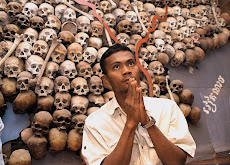
Mong Reththy is one of Cambodia’s most prominent tycoons and a close ally of Hun Sen. In 2006 he became a senator for the CPP.
Plantations, commodities trading, cattle farming and real estate development are just some of Mong Reththy’s interests. His eclectic business portfolio has also encompassed illegal logging in Bokor National Park and an economic land concession in Stung Treng which at 100,852 ha is more than ten times the size permitted by the Land Law. This ELC is sited on the cancelled Macro Panin logging concession in violation of the sub-decree on Forest Concession Management. Chan Sarun signed off on the deal in November 2001, three months after the passage of Land Law limiting ELCs to 10,000 ha. When Global Witness wrote to Chan Sarun to question the legality of his decision, the minister responded with the argument that the government was obliged to give Mong Reththy the concession because he had asked for it before the Land Law was ratified. In December 2006 Global Witness received reports from a human rights worker that Mong Reththy’s company had begun clearing parts of the Green Sea ELC close to the Lao border.
Mong Reththy has also been at the forefront of the recent rash of land-swap deals in which ownership of public buildings has been transferred to tycoons with links to the CPP. His land-swap acquisitions have included Cambodia’s Supreme Court, Appeals Court, Phnom Penh Municipal Court and Justice Ministry buildings. He has also flattened the historic Royal University of Fine Arts campus in Phnom Penh and forcibly evicted local residents in order to make way for a development he has named ‘China Town’.
The government’s decision to give the green light for Oknha Mong Port demonstrates considerable confidence in a man previously subject to allegations of drug trafficking. Claims that there was more to Mong Reththy’s import-export business than met the eye first surfaced in April 1997, when officials in Sihanoukville seized seven tons of marijuana from containers labeled as rubber. Newspapers reported that documents taken during the seizure bore stamps and seals of a company belonging to Mong Reththy. In media interviews Mong Reththy denied any involvement.
Secretary of State at the Ministry of Interior Ho Sok, a member of the CPP’s Funcinpec coalition partner, led the investigation into Mong Reththy’s alleged connection with the marijuana. His announcement that a court was preparing an arrest warrant for the tycoon prompted Hun Sen to comment that anyone attempting to arrest Mong Reththy had better “wear a steel helmet”. In July 1997, during the coup in which Hun Sen ousted his Funcinpec co-prime minister Prince Norodom Ranariddh, Ho Sok was detained by CPP forces and murdered. The investigation into Mong Reththy’s dealings proceeded no further.
Mong Reththy has continued to deny any connection with drug trafficking. In an interview with a local newspaper in 2004, he said “I was accused of planting and smuggling marijuana. I have tried to ignore it. I have never even smoked a cigarette in my life, so how could I do business like that? I only do what is legal”.
Global Witness wrote to both Mong Reththy and Hun Sen to ask them for their comment on the reports of drug trafficking. As this report went to print, Hun Sen had not replied, however Mong Reththy’s lawyer responded by e-mail as follows: “We have received the inquiry from your office related to Mr Mong Reththy and he is pleased to receive it. Mr Mong has asked us to inform you that he is unable to give Global Witness a written statement BUT he is willing to interview with a Global Witness representative in Phnom Penh or in London. If you have any further inquiry, please do not hesitate to contact us.”
Global Witness accepted the invitation to take part in an interview with Mong Reththy, and proposed a tape-recorded discussion over the telephone. At the time of the report’s publication, Mong Reththy’s lawyer had not responded to this proposal.








